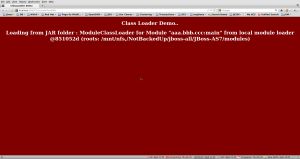How to load jars residing over NFS in JBossAS7 classpath ? --reference
In this article we will discuss how can we load jars residing over NFS in JBoss AS-7 classpath. In some development environment, when there are multiple jars and properties files are being used by multiple servers, it is good to put all of them in a central repository, so that if the files (jar/properties files/xmls) are modified, all the servers will pickup the latest version and there will be less overhead related to copying the latest versions to individual servers
NFS allows a user on a client computer to access files over a network in a manner similar to how local storage is accessed. I installed NFS using below link :
Remote_Disk_Access_with_NFS#Installing_NFS
As JBoss AS-7 has introduced a module structure to load your custom jars. One can quickly create a custom module and put the required jars in them, with appropriate entries in module.xml . But in this case we would be needing an additional module directory, which would be residing over NFS server and we would map this to our local (client) server.
Step-1: Modify standalone.sh and add a separate module directory. To do this navigate to $JBOSS_HOME/bin and edit the file.
Search for keyword “module” and it should look like below :
.. if [ "x$JBOSS_MODULEPATH" = "x" ]; then JBOSS_MODULEPATH="$JBOSS_HOME/modules" fi ..
Edit the above section of your “standalone.sh” script and then add the “:” separated path of your module directories as following
.. JBOSS_MODULEPATH=/mnt/nfs:$JBOSS_HOME/modules #if [ "x$JBOSS_MODULEPATH" = "x" ]; then # JBOSS_MODULEPATH="$JBOSS_HOME/modules" #fi ..
Here /mnt/nfs/ is the directory, where our new module directory would be residing.
Step-2 : On the shared mount create below directory structure :
.. /mnt/nfs/ ├── aaa └── bbb └── ccc └── main ├── module.xml ├── utility_JAR.jar ..
where
module.xml :
.. <?xml version="1.0" encoding="UTF-8"?> <module xmlns="urn:jboss:module:1.1" name="aaa.bbb.ccc"> <resources> <resource-root path="utility_JAR.jar"/> </resources> </module> ..
Step-3 : Now lets create a simple application which would be using utility_JAR.jar (ClassLoaderTestWAR.war). The war file will have below structure :”
.. ClassLoaderTestWAR.war/ ├── index.jsp ├── WEB-INF ├── jboss-deployment-structure.xml ├── web.xml ..
Where :
index.jsp :
.. <html> <head><title>ClassLoader Demo</title></head> <body bgcolor="maroon" text="white"> <center> <h1>Class Loader Demo..</h1> <% aaa.bbb.TestUtility utility=new aaa.bbb.TestUtility(); String whichClassLoader=utility.sayWhichClassLoader(); System.out.println("\n\n\t -----> "+whichClassLoader); out.println("<h1>"+whichClassLoader+"</h1>"); %> </body> </html> ..
jboss-deployment-structure.xml :
.. <?xml version="1.0" encoding="UTF-8"?> <jboss-deployment-structure> <deployment> <dependencies> <module name="aaa.bbb.ccc" /> </dependencies> </deployment> </jboss-deployment-structure> ..
web.xml :
.. <web-app> <welcome-file-list> <welcome-file>index.jsp</welcome-file> </welcome-file-list> </web-app> ..
Step-4 : Now deploy the application and start the JBoss AS-7 server.
Step-5 : Access the application using : http://localhost:8080/ClassLoaderTestWAR
You will see something like below :
If the above output comes that means the jar was loaded from our new module directory, which resides over NFS.
原文地址:http://middlewaremagic.com/jboss/?p=2561
